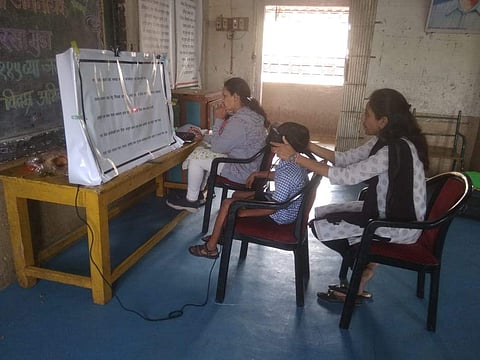

When Teena Paul's son was diagnosed with dysgraphia, a learning disability that affects writing abilities, at the age of 13, she got him a special educator. Today, her son has not only dealt with his learning disability, he has also graduated from college. But there are many kids like him who find it difficult to read, write and identify letters and numbers, who haven't been given the chance to improve. That's why Teena founded GiftoLexia, a start-up that helps teachers identify learning disabilities in children at an early age by providing them with training as well as through their unique method called Gaze Pattern Based screening.
Teena was selected for the Woman Start-up programme by IIMB's NSRCEL in 2017 and that's where GiftoLexia was incubated. She says, "Since I had first-hand experience dealing with learning disability, I developed a more accurate, easier and faster screening method that can be adopted in schools. Then with the help of other collaborators in Bengaluru, I went ahead and digitalised the process too. There are three different stages — reading test, analysis and results. Whenever we go to schools, we hold this screening test for every individual separately. We conduct the test in the school premises, taking only a few minutes per student. The child reads a few sentences on a poster while their eye movements are recorded using an eye-tracking device. The test is age and language specific. So far, we have done this test in English and Marathi. The tracking of the eye movement reflects the cognitive process of the child while reading. We collect data in this process and analyse it accordingly. Then, we identify children within the risk levels and outside the risk level and give individual reports to the schools."
GiftoLexia's role doesn't stop with the identification, analysis and submitting of reports. They communicate with teachers and sometimes parents and suggest early intervention programmes that they can adopt. "What we suggest is to increase the reading fluency of children. We help them by providing online phonics workshops and suggest to the schools to provide easy crafts, colouring exercises, mazes, simple logic problems and riddles to solve and so on. We also advice parents to have a special educator so that kids can get sufficient time to improve."
Teena's team at GiftoLexia provides two hours training for teachers too through their various programmes. "Our education system is such that teachers are trained in everything except handling learning disabilities in kids. Hence, we do a two-hour session to introduce various learning disabilities. Then we educate them on the intervention and help them understand the mental health of these kids. We even explain to them what special educators can do. We train them to read phonics, to teach Maths in a fun way by doing various art and crafts and so on," explains Teena.
While all these sessions have been happening in several schools, Teena's team has approached several state governments to introduce this screening method in the regional language in schools. "We have approached the Kerala government to introduce this method in Malayalam. Going forward, we will be introducing it in other regional languages, especially in South India," she concludes.
